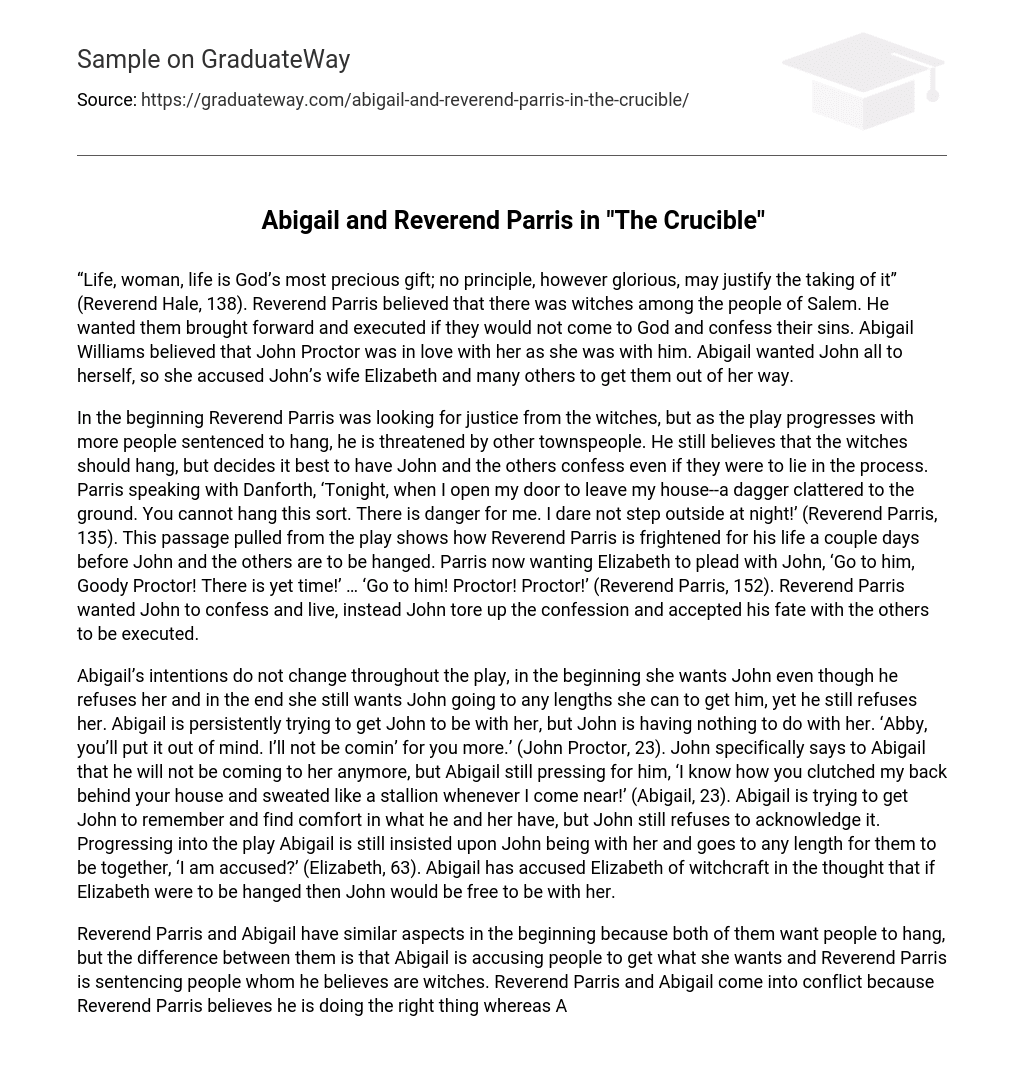“Life, woman, life is God’s most precious gift; no principle, however glorious, may justify the taking of it” (Reverend Hale, 138). Reverend Parris believed that there was witches among the people of Salem. He wanted them brought forward and executed if they would not come to God and confess their sins. Abigail Williams believed that John Proctor was in love with her as she was with him. Abigail wanted John all to herself, so she accused John’s wife Elizabeth and many others to get them out of her way.
In the beginning Reverend Parris was looking for justice from the witches, but as the play progresses with more people sentenced to hang, he is threatened by other townspeople. He still believes that the witches should hang, but decides it best to have John and the others confess even if they were to lie in the process. Parris speaking with Danforth, ‘Tonight, when I open my door to leave my house–a dagger clattered to the ground. You cannot hang this sort. There is danger for me. I dare not step outside at night!’ (Reverend Parris, 135). This passage pulled from the play shows how Reverend Parris is frightened for his life a couple days before John and the others are to be hanged. Parris now wanting Elizabeth to plead with John, ‘Go to him, Goody Proctor! There is yet time!’ … ‘Go to him! Proctor! Proctor!’ (Reverend Parris, 152). Reverend Parris wanted John to confess and live, instead John tore up the confession and accepted his fate with the others to be executed.
Abigail’s intentions do not change throughout the play, in the beginning she wants John even though he refuses her and in the end she still wants John going to any lengths she can to get him, yet he still refuses her. Abigail is persistently trying to get John to be with her, but John is having nothing to do with her. ‘Abby, you’ll put it out of mind. I’ll not be comin’ for you more.’ (John Proctor, 23). John specifically says to Abigail that he will not be coming to her anymore, but Abigail still pressing for him, ‘I know how you clutched my back behind your house and sweated like a stallion whenever I come near!’ (Abigail, 23). Abigail is trying to get John to remember and find comfort in what he and her have, but John still refuses to acknowledge it. Progressing into the play Abigail is still insisted upon John being with her and goes to any length for them to be together, ‘I am accused?’ (Elizabeth, 63). Abigail has accused Elizabeth of witchcraft in the thought that if Elizabeth were to be hanged then John would be free to be with her.
Reverend Parris and Abigail have similar aspects in the beginning because both of them want people to hang, but the difference between them is that Abigail is accusing people to get what she wants and Reverend Parris is sentencing people whom he believes are witches. Reverend Parris and Abigail come into conflict because Reverend Parris believes he is doing the right thing whereas Abigail knows she is doing wrong by accusing people. Parris genuinely believes in heaven and hell, ‘Cast the devil out! Look him in the face! Trample him! We’ll save you, Mary, only stand fast against him and–’ (Reverend Parris, 123). In this case he believes that the devil has taken over Mary Warren and is using her to project into the other girls. Abigail on the other hand is deceiving everyone else on purpose, “(Mary utters something unintelligible, staring at Abigail, who keeps watching the “bird” above.)” (123). When Mary says something that the girls could not hear the girls would not repeat it. It was only when Mary said something aloud that Abigail and the other girls would mock her. The stage commands from the play in act three shows that Abigail is copying Mary on purpose rather than being forced.
In conclusion, Reverend Parris always believed what he was doing was right even if his actions were actually wrong. Abigail knew she was doing wrong and did not care who was hurt in the process because she was being selfish by wanting John all to herself. Life is indispensable and special, in the time of the Salem Witch Trials people forgot this. Anyone who was even a little bit out of the ordinary or broke from tradition was immediately accused by neighboring people. In this time people were confused and scared, just like Reverend Parris. They wanted to protect themselves and the only way they thought to do that was by accusing other people before they could be accused themselves. Other people used this as a chance to accuse people whom they did not like to be rid of them, much like Abigail. In the end lives were lost, some mourned for them and others did not. Always appreciate life for you never know when your time will come to an end.





